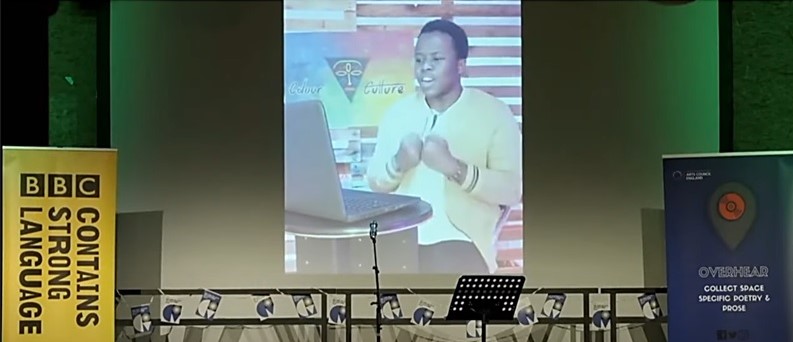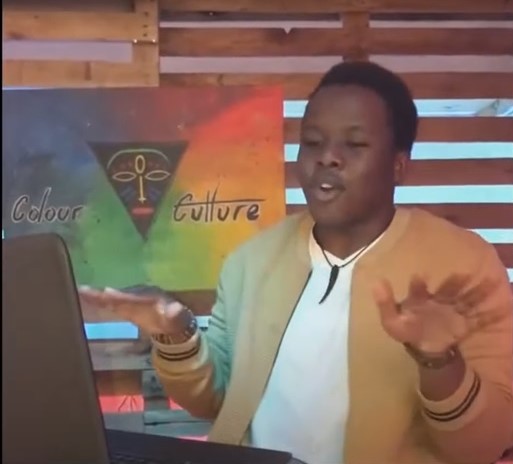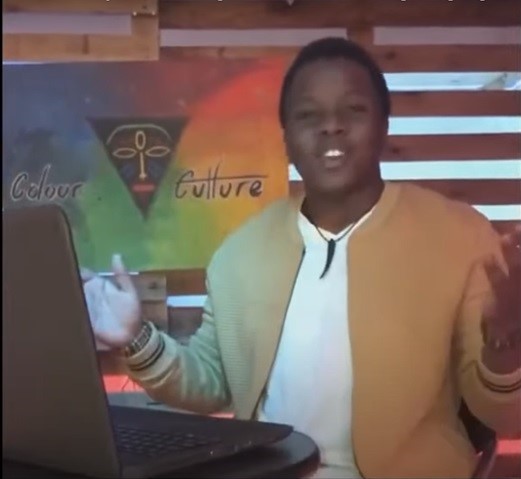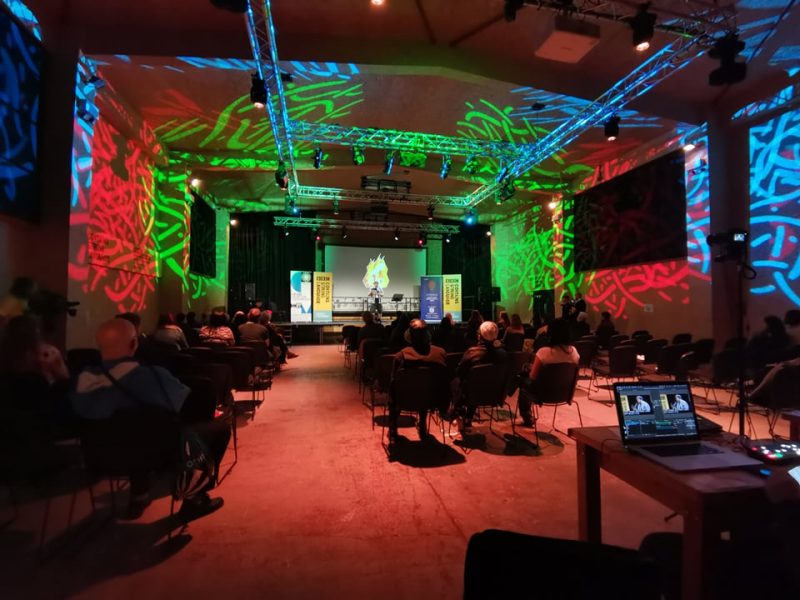INTERVIEW: FIRE & DUST MEETS MUSENGA KATONGO
We are born with unclenched fists to take what is ours with open paws,
So what if I told you that everything the light touches was yours?
Everything tapped or pinched by light beams to the tiniest inch is your birth right
And if I’m not mistaken, the sun doesn’t only shine on earth, right?
____________________________________________-Musenga L. Katongo
Musenga Katongo is a poet and author from Lusaka, Zambia. He is a three-time international and local poetry slam champion, and a TEDx Performer. Musenga is also the award-winning entrepreneur behind the educational creative arts platform ‘Colour Culture Arts’, driven by his desire to tell creative African stories that educate, entertain and empower, thereby promoting identity and unity amongst fellow Zambians.
On 26th September 2021, Musenga joined us as guest headliner for a Fire & Dust special at the BBC’s Contains Strong Language Festival. To avoid technical difficulties on the night, he filmed a video of his performance and we played the pre-recorded segment on the big screen for a live audience. We caught up with Musenga after the event, to ask a few questions…

HCE: Tell us a little about your background and journey as a writer so far. What first inspired you to get into writing and performing poetry?
MK: I began writing poetry when I was in the eleventh grade. I was inspired by a poetry group that visited my high school and performed so well that I told myself ‘I want to try this out’. After watching a couple of poetry videos online and being surrounded by like-minded classmates who were also writers, my passion for poetry burned more and more.
So far my journey has been exciting and filled with lessons. My interaction with poets I look up to who are based here in Lusaka accorded me the opportunity to learn so much from them. I cannot dare say I have come this far on my own. With the experiences and accolades I have earned for myself, I can only attach their attainment to the fact that I have stood on the shoulders of giants.
HCE: Who is your work aimed at – do you have an ideal audience in mind when you’re putting a poem together?
MK: I usually write to express myself or an idea and whoever finds themselves on the opposite end of my poetry gets to hear it. But I do enjoy writing poetry that provokes young people in my age bracket (18-24) to think outside the box, to be proud and confident in their identity and offer them perspective on human experiences.
HCE: Would you say there are themes or motifs that you gravitate to in your writing?
MK: One thing that I find myself repeating in my work is the theme of legacy. I am a huge advocate of young people living their lives purposefully. After losing my dad to a sudden and very short illness, I learned first hand how short and unpredictable life is and how it should not be taken for granted. With that said, I have found myself speaking about legacy from different fronts, so as to offer different perspectives on the subject.
Another theme I gravitate towards is the pride in being African. Zambian history and culture is so rich with stories, practices, beliefs and traditions worth every stanza I write about it. Being African, more specifically Zambian, grants me the vantage point to write about the things we are (and should be) proud about over here.

HCE: Have you always been a confident performer, or were you nervous when you first started out?
MK: Funny thing is I was once the kid who wanted to perform but struggled with stage fright. It really took a toll on me in eighth grade. But with the presence of a couple of seniors at my high school who chose to take some time to help me, I wound up overcoming my stage fright and blossoming from there.
HCE: What can audiences expect if they are lucky enough to attend a Musenga Katongo poetry set?
MK: They can expect to be encouraged, motivated and shown the value of their life; all wrapped around well-told stories and words meant to tickle their ears. They would get a sneak peek into my worldview, my experiences and leave with a new perspective.
HCE: You have a published collection and are also involved in a lot of performative opportunities. Do you feel there’s a difference between writing poetry designed to be experienced ‘on the page’ and writing for ‘the stage’?
MK: I’ve had the privilege of holding writing classes here in Lusaka and I have always stressed the distinction between page poetry and spoken word. Page poetry has (or at least it should) have a structure and pattern to it that not only is pleasing to read but also has a visual aesthetic based on the length and grouping of lines. Spoken word on the other hand can equally be structured, but I personally approach it with a freeverse style that is meant to capture audiences with literary devices that would be easily picked up if said out loud.
HCE: In your experience, is Lusaka a good place to be a writer, and does it have a thriving poetry scene?
MK: Lusaka is a very active city when it comes to the arts in Zambia. There are plenty of opportunities to engage in artsy activities of any kind with cultural centres, galleries, youth hubs, arts events, festivals and creative workspaces. Of course the pandemic has not done us any favours but on a regular day, if you were a writer in Lusaka, you would be in a place spoiled for choice in activities.
The poetry scene in Lusaka is currently run by two poetry houses, Colour Culture Arts and Word Smash Poetry. Both platforms are offering poets opportunities to perform, learn, collaborate and share their work while adjusting to the new normal. Are we where we want to be? Not yet, after all there is always room for improvement. However, the consistency with regard to activity allows me to say we do have a very active poetry scene here.

HCE: You were also involved in the Contains Strong Language DigiPoems project – can you tell us a little more about that, and did you enjoy the collaboration process?
MK: I definitely enjoyed every part of it! From the writing process to recording the poem to engaging with Dana Chis (the digital artist I was paired with) and ultimately watching the final digipoem. It was my second time being part of Digipoems, the first time being in 2019 which was an equally awesome experience. Hopefully I’ll be part of it for a third time (wink, wink)…
HCE: Do you enjoy competing in poetry slam events? What are some good ways to prepare for a slam?
MK: I absolutely love it! I personally feel poetry slams grant me the challenge I need to improve my performance and writing. My favourite experience from competing in a slam came when I travelled to Bulawayo and got to participate in the Intwasa Poetry Slam. It’s my favourite because I got to win the slam by crowd reaction! There I was, a Zambian poet in a slam consisting of Zimbabweans and winning despite not having the home ground advantage. It was an honour and a truly humbling experience.
How to prepare for a slam? Know the rules and write your poems with the rules in mind. Once you have something that can woo the judges or the audience, it’s time to practise, practise and practise again. I recall how I have spent my time between rounds at slams practising like my life depended on winning that slam. And quite frankly, it has worked out for me.
HCE: What type of poetry do you seek out for personal enjoyment? As a reader/listener, when you engage with a poet’s work, what are you hoping to get out of it?
MK: I prefer spoken word poetry to page poetry more because of the theatrics that comes with the former. I usually look for a unique delivery style and engaging performance with body language and great voice projection. But overall, I love creatively written work that finds out-of-the-box ways of addressing simple things. Here in Lusaka there are poets such as Destro FNP, Vanessa Chisakula, Kiesha Hill, Magnifaya and Mwelwa On Cos who have all displayed what it takes to write from unique angles and express ideas in out of this world ways.

HCE: It’s becoming a slightly better question to ask and answer, compared to earlier in 2021…what is next on the horizon for you? Are you already working on new projects/booked for upcoming performances?
MK: 2022 is a year in which I want to pursue exponential growth of my platform, Colour Culture. I’m determined to achieve with my team further growth of the poetry scene in Lusaka and accord more opportunities for poets here to be granted opportunities to learn and collaborate. We are open to more collaborations and look forward to creating synergies with poets and creative artists the world over.
HCE: What’s the best way for people to keep connected with you and your work?
Twitter Instagram Facebook YouTube
